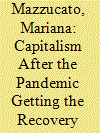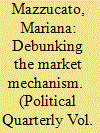| Srl | Item |
| 1 |
ID:
175220


|
|
|
|
|
| Summary/Abstract |
After the 2008 Änancial crisis, governments across the world
injected over $3 trillion into the Änancial system. The goal
was to unfreeze credit markets and get the global economy
working again. But instead of supporting the real economy—the part
that involves the production of actual goods and services—the bulk of
the aid ended up in the Änancial sector.
|
|
|
|
|
|
|
|
|
|
|
|
|
|
|
|
| 2 |
ID:
126998


|
|
|
| 3 |
ID:
136501


|
|
|
|
|
| Summary/Abstract |
The conventional view of what the state should do to foster innovation is simple: it just needs to get out of the way. At best, governments merely facilitate the economic dynamism of the private sector; at worst, their lumbering, heavy-handed, and bureaucratic institutions actively inhibit it. The fast-moving, risk-loving, and pioneering private sector, by contrast, is what really drives the type of innovation that creates economic growth. According to this view, the secret behind Silicon Valley lies in its entrepreneurs and venture capitalists. The state can intervene in the economy—but only to fix MARKET failures or level the playing field. It can regulate the private sector in order to account for the external costs companies may impose on the public, such as pollution, and it can INVEST in public goods, such as basic scientific research or the development of drugs with little market potential. It should not, however, directly attempt to create and shape MARKETS. A 2012 Economist article on the future of manufacturing encapsulated this common conception. “Governments have always been lousy at picking winners, and they are likely to become more so, as legions of entrepreneurs and tinkerers swap designs online, turn them into products at home and market them globally from a garage,” the article stated. “As the revolution rages, governments should stick to the basics: better schools for a skilled workforce, clear rules and a level playing field for enterprises of all kinds. Leave the rest to the revolutionaries.”
|
|
|
|
|
|
|
|
|
|
|
|
|
|
|
|